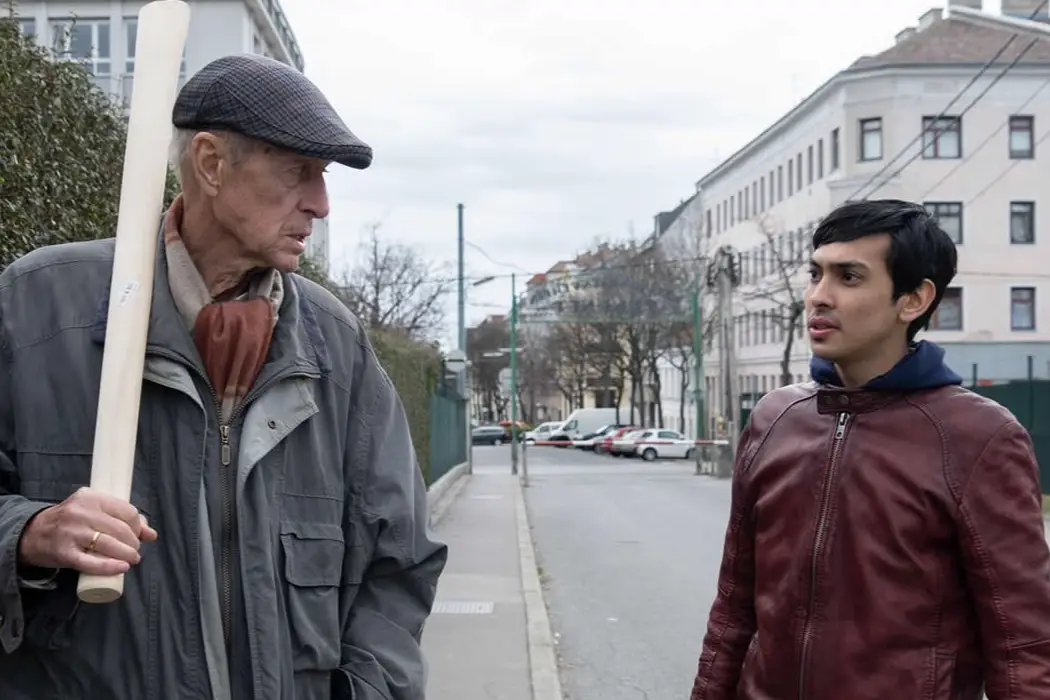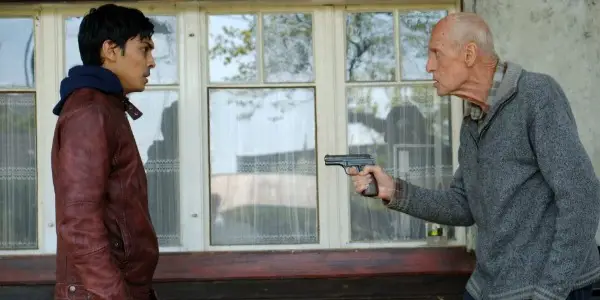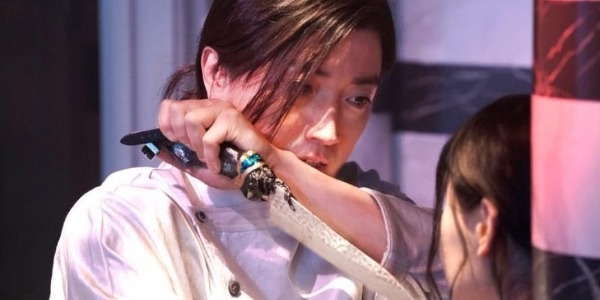Fantastic Film Festival Australia 2020 Report: NOBADI & DINER

Alex is a 28 year-old West Australian who has a…
Describing itself as a “A home for mind-breakers, trend-setters, razor-walkers, loose-wires, truth-talkers, trailblazers and envelope-pushers”, the launch of the Australian Fantastic Film Festival this year is a breath of fresh air in the realm of touring Australian film festivals; whilst the locale-based programs that make their annual rounds each year – we’re weeks away from the French Film Festival kicking off its national theatrical excursion – usually eek out a spot or two to indulge in the genre-infused offerings from their respective countries, FFA 2020 is the ultimate tribute to genre cinema itself; foreign or moral boundaries be damned.
Ahead of its February 20th launch date, I had the pleasure of previewing two of its most eclectic entries: Nobadi from Germany and Diner from Japan.
Nobadi (Karl Markovics)

When we first encounter Robert (Heinz Trixner) in Karl Markovics’ Nobadi, the 91 year old German pensioner – sculpted from the same obsolescent woodblock that Walt Kowalski, Clint Eastwood’s growling geriatric from Gran Torino, seemingly sprang from – has awoken to every pet owner’s worst nightmare: his best (and only) friend in the world, his loyal dog, has died. Unable to dig a proper grave in his backyard due to an obstinate tree root and a busted axe handle, the grieving ex-war nurse is forced to call upon the help of a drifting day labourer, Adib (Borhanulddin Hassan Zadeh). Unable to stifle his risible contempt for the desperate worker, their thorny interactions trace a tempered ethnographic portrait of modern Austria where foreigners, whether it be in the literal or pejorative sense, are met with distrust, paranoia and outright rejection.
Uncovering the dirt in both the ground and their personalities, their incipient rapport flowers into the feel-good ‘white-saviour’ narrative that might’ve earned it the breathless description of being Austria’s answer to Green Book (or more appropriately Gran Torino), until Adib complains of a wounded foot and Robert, in his Grinch-esque arc of internal redemption, takes extreme measures to ensure the best health care he can for his new impaired aide. It’s this second act turn that earns its place within Fantastic Film Festival’s kaleidoscopic lineup – there’s sure to be at least one walkout when this goes from Green Book to Green Room.
For his third feature, Markovics doesn’t aim for a bait-and-switch approach to this grim scenario, but rather an anatomical one, its pragmatic procedure a mere extension of Robert’s rather bittersweet senior second thoughts. This growth is explicitly framed within his initial treatment of Adib; he barks orders, serves him dog food for lunch and even confiscates his phone like a strict school principal would. With one hole being created, another is filled as Adib’s naïve affectations, including referring to Robert as “master”, has unknowingly won Robert over by unintentionally role-playing as the stiff-lipped senior’s deceased dog, a peculiar position tempered with an emotional integrity that’s delivered in a pleasantly unpretentious manner (and solidified by a late night impulsive trip to the vets for medicine).
Nobadi successfully avoids being just another brazen genre exercise, its rapid alternation between blood and brotherhood is deftly weaved throughout its delicately modulated tone. Its unwavering conviction to its brutal conclusion never undercuts its sincerity, somehow earning its spot alongside both midnight genre festivals and the drama spotlight at your local foreign film showcase – like the mismatched friendship that anchors this drama-thriller hybrid, its two distinct halves work in tandem with each other, culminating in a merciless act that is at once rough and too painfully real.
Diner (Mika Ninagawa)

Before The Continental TV show extends the John Wick universe outside of its juggernaut (by the time of its release) four film franchise, appetites can be whet by Japanese fashion photographer-turned-filmmaker Mika Ninagawa’s manic neon-nightmare Diner, which feels cut from the same bloodied cloth as Chad Stahelski’s ‘honor amongst thieves’ samurai-inspired Wick series.
Best described as Takashi Miike’s anarchic sensibilities being shuffled into John Wick’s Continental hotel, Ninagawa’s third feature draws heavily from her fantastical photography work, which was described by Japanese photographer Daido Moriyama as “an indubitable work of visual scandal—an assault”, noting her striking use of effusive colours and dream-like manipulations of life; a succinct summation of her cinematic approach to Yumeaki Hirayama’s novel and ensuing manga series.
Adapted to the screen by Hirohito Goto, Yoshikazu Sugiyama and Mika Ninagawa, Diner begins with the solitary but sweet Kanako Oba (Tina Tamashiro), whose desperation for a job leads her into the neon-soaked elegance of Bombero’s (Battle Royale’s Tatsuya Fujiwara) kitchen, an indomitable culinary artist whose varied clientele is limited to Japan’s most twisted assassins and underworld figures. Stuck as the restaurant’s only waitress, she must balance upon the delicate knife’s edge of her boss’s Gordon Ramsay-like temperament and her even more impulsively reckless customers.
As the range of hungry consumers become more ravenous for both food and bloodshed, an intense gang war starts to bubble within the seedy dining area, as Ninagawa punctuates these hiking tensions with bursts of John Woo-inspired shootouts, comical sword-fights and captivating food porn illustrations which feel lifted from one of her own photography collections. These action sequences, peppered in to a favourable degree, vibrate with an intense focus on pure, uncut entertainment; despite the hell that the poor waitress must endure, it sure makes for one hell of a rollercoaster ride for us at home.
Fantastic Film Festival Australia will be taking place in February 20-March 4 2020, details on their program and screening times can be found here.
Does content like this matter to you?
Become a Member and support film journalism. Unlock access to all of Film Inquiry`s great articles. Join a community of like-minded readers who are passionate about cinema - get access to our private members Network, give back to independent filmmakers, and more.












